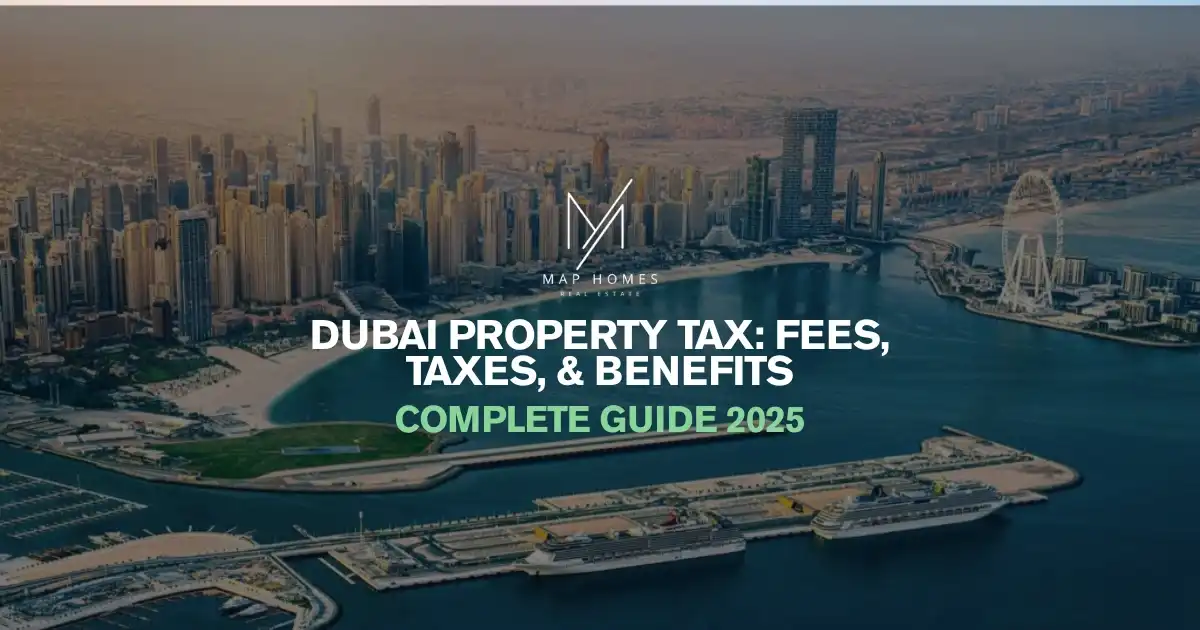
?️ Introduction
Dubai’s tax-friendly real estate ecosystem has long been one of the city’s biggest attractions for global investors. As we move through 2025, understanding the nuances of property taxation in Dubai is essential to maximizing returns and avoiding unexpected costs. This blog simplifies all key tax components—while comparing Dubai to countries like the UK, India, and Pakistan—to give investors a holistic view.
? Understanding Dubai’s Property Tax Framework
Dubai stands out as one of the few places where real estate investors enjoy zero personal income tax, no capital gains tax, and no inheritance tax. These core tax advantages make the emirate a global real estate hotspot.
✅ Summary: Dubai’s Tax Environment (2025)
| Tax Type | Dubai (2025) | Explanation |
|---|---|---|
| Income Tax | 0% | No personal income tax on rental earnings |
| Capital Gains Tax | 0% | No tax on property sale profits |
| Inheritance Tax | 0% | No estate/inheritance tax (Sharia law applies if no will) |
| Corporate Tax | 9% (conditional) | Applies only to company profits > AED 375,000 |
? DLD Fee – The One-Time Property Transaction Cost
Though there’s no recurring property tax, investors must pay a 4% Dubai Land Department (DLD) fee upon registering a property transaction. It's a significant but predictable cost in the purchase process.
? Breakdown: DLD Fee on AED 2 Million Property
| Calculation | Amount (AED) |
|---|---|
| Property Price | 2,000,000 |
| 4% DLD Fee | 80,000 |
| Admin Fee (> AED 500K) | 4,000 |
| Total Registration Cost | 84,000 |
Some developers offset these costs partially or fully—particularly for off-plan properties.
? Corporate Tax: When Does It Apply?
From June 1, 2023, the UAE began applying a 9% corporate tax on business profits exceeding AED 375,000. However, this does not apply to individuals investing in personal capacity.
? Real-World Example
A real estate firm earns AED 600,000 in annual profits. The first AED 375,000 is exempt.
Taxable amount = AED 225,000 → 9% Tax = AED 20,250
? Tax Applicability
| Investor Type | Taxable? | Details |
|---|---|---|
| Individual Buyer | ❌ No | No corporate or income tax |
| Corporate Entity | ✅ Yes (if eligible) | 9% on profits exceeding AED 375,000 |
| Passive Owner via Company | ❌ Possibly | May qualify for exemptions under specific conditions |
? Dubai vs UK vs India: A Global Perspective
To understand Dubai’s tax advantage, it helps to compare it against other prominent real estate markets.
? Tax Comparison – UAE, UK & India (2025)
| Tax Type | Dubai (UAE) | UK (2025) | India (2025) |
|---|---|---|---|
| Income Tax | 0% | 20%–45% | 5%–30% |
| Capital Gains Tax | 0% | 18%–24% | 12.5%–20% |
| Inheritance Tax | 0% | 40% | 0% |
| Transaction Fee | 4% DLD Fee | 0%–12% (SDLT) | 5%–7% Stamp Duty |
? Capital Gains Tax Comparison
Capital Gains Tax (%)
| UAE | █ 0
| UK | ████████████████████ 24
| India | ███████████████ 20
Insight: While investors in the UK or India face significant capital gains and inheritance taxes, Dubai provides a more tax-efficient structure for portfolio growth and estate planning.
? Rental Income and Taxes
In 2025, rental income remains tax-free for individuals. However, rental activity must comply with Dubai’s regulatory framework, including Ejari registration and payment of municipality housing fees.
? Rental Income Snapshot
| Rental Income Tax (Individual) | 0% |
| Ejari Requirement | Mandatory |
| Municipality Housing Fee | 5% of annual rent |
⚖️ Inheritance Tax and Property Succession
Dubai does not impose inheritance tax. Property succession is primarily governed by Sharia law for Muslims unless a legal will specifies otherwise. Non-Muslims can create wills to ensure their assets pass according to their wishes.
? The Role of Property Valuation in Dubai
Property valuation influences mortgage approvals, insurance, and the DLD transaction fee calculation. Dubai’s valuation is typically done by approved RERA valuers.
? Tax Residency and International Compliance
Owning property in Dubai does not confer UAE tax residency automatically. Investors should assess residency rules to optimize tax treatment in their home countries, especially in light of global tax treaties and CRS (Common Reporting Standard) compliance.
?️ VAT on Property Transactions and Services
VAT at 5% applies to new commercial properties and some real estate-related services but generally not to residential property sales or rentals.
? UAE vs. India vs. Pakistan: Tax Comparison
While Dubai is a tax haven for property investors, India and Pakistan impose income, capital gains, and inheritance taxes—with rates varying by income slabs and property value.
? Key Figures – Dubai Real Estate 2025
- Average Residential Property Price: AED 1.5 million
- Average Rental Yield: 6.5%
- Annual DLD Registrations: Over 100,000 transactions
- Property Sales Growth (YoY): 8%
? Conclusion
Dubai remains a highly attractive destination for real estate investors due to its zero personal income tax, no capital gains tax, and transparent fees like the DLD registration fee. However, staying aware of corporate tax rules and international tax residency requirements ensures compliance and maximizes benefits.